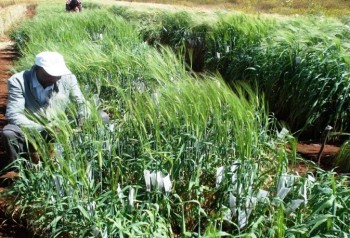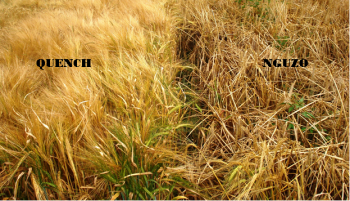The Barley Crop Research Project is a collaborative research project between University of Eldoret and East Africa Malting limited (EAML), a subsidary of East African Breweries (EABL), which is part of Diageo International. EAML is in charge of Agriculture department, which carries out barley research through University of Eldoret and malt barley production. The barley crop research project was successfully bidded for and won by UoE school of Agriculture and Biotechnology in 2010 and is being implemented in 3-year phases to date. To date, the project has been funded to the tune of Ksh. 9,687,850 per year (crop season) with the budget for each phase being approximately Ksh 30 million. The project is coordinated by Project PI and Coordinator – Prof Julius O. Ochuodho, Department of Seed Crops and Horticultural Sciences, School of Agriculture and Biotechnology.
Julius Onyango Ochuodho is a professor of Agriculture of the University of Eldoret, specialized in Seed Science and Technology. He obtained PhD from the University of Natal, South Africa (2005) and has many certificates in plant sciences both local and international. His research interest revolve around seed science and technology with interest in domestication and commercialization of underutilized indigenous species. Prof Ochuodho worked with the Ministry of Agriculture under Kenya Agricultural Research Institute till 1997, where he was a Research officer and rose to Deputy Center Director position, managing research projects and seed certification. He was Dean of the School of Agriculture and Biotechnology and has coordinated and participated in many collaborative research projects both local and international. He has published over 50 scientific articles in reputable refereed journals and many articles in other forms of publications, including 5 Book chapters; supervised and graduated 40 MSc and 12 PhD. He was a member of RUFORUM Technical Committee for 10 years (2009-2018), charged with issuing competitive research grants, Monitoring and evaluating their implementation. Currently Prof Ochuodho is involved in Resource Mobilization for the university, Deputy Chair Agribusiness Trade Fair, Chair Board of Directorate of Research and Innovations and Chair of the Professor’s Committee. He coordinates the Barley research project funded by EABL, SCIFSA, RUFORUM GTA scheme and ENABLE Youth Kenya; participates in many research projects including LEAP-Agri. He is a reviewer of some scientific journals including African Journal of Agricultural Research, African Journal of Agriculture and Rural Development and a member of Horticultural Association of Kenya and American society of Plant pathologists, among others.
The overall objective of the project was to improve barley crop production through development of varieties and improved crop husbandry . Specific objectives of the project include Development of new varieties, Improvement of crop husbandry through better agronomy, crop protection and agrochemical efficacy trials, Basic seed production, and Training students and farmers on new and innovative technologies
The following are the key outcomes/outputs of the project:
- Released varieties: The project developed and released 5 new barley lines (varieties) – Fanaka, Quench, Grace, Aliciana, Cerise (Figures 1 & 2). The release of another two (Shuffle and Tipple) are at an advanced stage.
- Chemical efficacy trials: During the period of the project chemical efficacy trials were carried out on several products, many of which have been recommended for farmer use. Research on the following herbicides have been completed and forwarded for consideration by the Crop Pest products board (PCPB): – Agromine, Perk, Roundup, Vigon, Tributary, Bell Amine, Glean, Celest, Agromine, Aurora Turbo, Twigathrin, Twigabrom, Glycel, Deft. The same has been done for the following Foliar fungicides - Azimuth, Discovery, Quilt, MASTERCOP, Merryzole, Trichotech; Cherokee, Bontima, Stamina, Tandem, Sargo, Goddard, Jupiter, Classic, Acanto plus; Insecticides - Bullet, and Foliar fertilizers – Allwin top, Kuzar, Topsil, Lithovit
- Education and Training: The project has contributed immensely to training of students and staff. In Phase I (2010 – 2013) 8 MSc students were funded and trained in Agronomy (1), Breeding (3), Pathology (1), seed science (2) and soil science (1) out of these, 6 students successfully completed their studies and graduated. In Phase II (2013 April to 2016 March) one PhD Pathology and two MSc Agronomy students successfully completed their courses while one is still going on. currently in Phase III, three MSc students are undergoing training with one in Seed technology, agronomy and pathology each. The project has also trained a number of farmers on good agricultural practices (GAP) and seed production in malt barley – 160 farmers and sorghum – 150 farmers.
- Malt barley production. The project produces all the breeders’ seed to facilitate the production of malt barley – a total of 30-40 tons every year . This seed is used to produce barley for brewing by many farmers in Njoro, Mau Narok, Timau and Uasin Gishu (Moiben) regions. More than 400 barley farmers are involved in this activity. We have also been involved in soil sampling, testing and recommendations to facilitate fertilizer use efficiency in barley production.
- Extension and outreach. The project participates in these activities especially barley field days, most of which are held in Mau Narok; where we explain barley crop husbandry and any new varieties entering production cycle. These organized together with the Cereal grain growers association and agrochemical industry. Similarly we participate in the Agribusiness Trade Fair organized by the University of Eldoret
Research papers published
- Javan Omondi Were, Julius Onyango Ochuodho, Nicholas Kipkemboi Rop and Sanjaya Gyawali (2020). Rapid Screening Method for Tolerance to Aluminium Toxicity in Barley: Case Study on Commonly Grown and Newly Bred Genotypes in Kenya. International Journal of Plant Breeding and Genetics, 14 (1): 1-8; ISSN 1819-3595 DOI: 10.3923/ijpbg.2020.1.8
- Kipkogei Chemitei, Makumba B. Amendi, Lizzy A. Mwamburi, Julius Onyango Ochuodho (2019). Bio-Control of Net-Blotch and Scald Pathogens of Barley Using Paenibacillus Polymyxa KAI245 Isolated from Sorghum Rhizosphere in Western Kenya. American Journal of Microbiological Research, 2019, Vol. 7, No. 1, 28-36
- Nadir S. Waluchio, Caleb O. Othieno, Wilson K. Ng’etich and Julius O. Ochuodho (2015). Evaluation of Nitrogen Fertilizer and Lime on Grain Yield, Protein Content and Kernel Weight of Barley (Hordeum vulgare L.) in Kenya. International Journal of Plant & Soil Science, 8(4): 1-7, 2015; Article no.IJPSS.6239 ISSN: 2320-7035
- Javan Omondi Were, Julius Onyango Ochuodho (2014). Sensitivity of Barley (Hordeum Vulgare) to Phosphate Fertilizer Formulations under Acidic Soils in Kenya. International Journal of Research Studies in Biosciences (IJRSB) Volume 2, Issue 6, July 2014, PP 50-59 ISSN 2349-0357 (Print) & ISSN 2349-0365 (Online)
- Abigael Adhiambo Owino, Julius Onyango Ochuodho, Javan Omondi Were and Nicholas Rop (2014). Response of spring and winter barley to Pyrenophora teres under high and medium altitude zones of Kenya. International Journal of Research In Agriculture and Food Sciences Vol. 2, No.2: 1-10 June. 2014 ISSN 2311 -2476
- Abigael A Owino, Ochuodho JO and Javan O Were (2013). Morphological diversity of net blotch fungi (Pyrenophora teres) infecting barley in barley growing areas of Kenya. Journal of Experimental Biology and Agricultural Sciences, December - 2013; Volume – 1(6). ISSN No. 2320 – 8694



